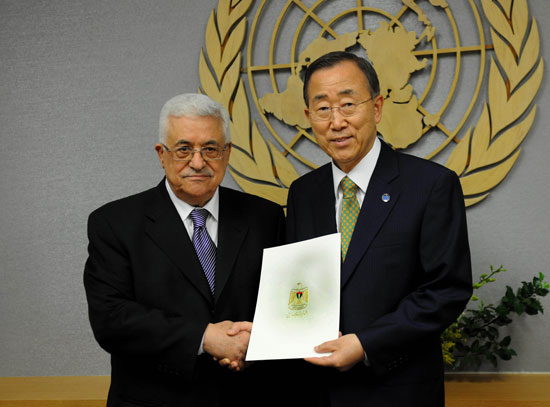Palestinian statehood bid on UN fast-track
 0 Comment(s)
0 Comment(s) Print
Print E-mail
Xinhua, September 24, 2011
E-mail
Xinhua, September 24, 2011
Palestine's dramatic formal application on Friday for United Nations' full recognition as a member state has already resulted in a date early next week for Security Council consultations and the diplomatic Quartet setting out a framework for negotiations between the Palestinians and Israelis.
|
|
| Palestinian President Mahmud Abbas (L) hands the application letter to UN Secretary-General Ban Ki-moon in a bid to seek the UN recognition of Palestine as a full member state, at the UN headquarters in New York, the United States, on Sept. 23, 2011. [Xinhua/AFP] |
He received a standing ovation before saying a word and his 40- minute speech was interrupted five times by applause, including another standing ovation. Calling settlement activities the core of the problem over Israel's occupation, Abbas said these policies violate international law.
He said Israel has been trying to "redraw the borders on our land according to what it wants and to impose a fait accompli on the ground that changes the realities, and that is undermining the realistic potential for the existence of the state of Palestine."
The secretary-general reviewed the application and within hours a spokesman said the request had been sent to the UN Security Council, where it would ultimately face a vote. UN procedure calls for Ban to review and forward such a petition if deemed proper.
Several countries in the council have pledged their support for Palestinian statehood bid, but Israel's close ally, the United States, has threatened to use its veto.
Shortly after it was sent, Ambassador Nawaf Salam, Lebanon's permanent representative at the United Nations and this month's president of the Security Council, consulted with the other 14 members of the panel and agreed to schedule initial consultations on the request for Monday afternoon.
It is likely to go to a committee made up of all member states of the council for consideration before returning it within weeks to the full council for a vote.
Procedure in the world organization calls for the panel of 15 to "recommend" the application to the General Assembly before the 193-member body.
If it fails to garner nine votes in the council, without a negative vote by one of the five veto-wielding permanent members of Britain, China, France, Russia and the United States, it dies.
However, the door would still be open for the Palestinians to take their bid directly to the General Assembly in an attempt to gain a lesser status of non-member observer state. It already has widespread support and the measure would likely be approved by a simple two-thirds majority.
The notion of the United Nations granting statehood is incorrect since it does not. An entity is regarded as a state when it meets conditions of the 1933 Montevideo convention.
Those protocols spell out a state should have a defined territory, a permanent population in it, a government representing it and the ability to enter into relations with other states.
Abbas concluded his speech by saying that Palestinian statehood would not preclude or contradict the peace talks with Israel that have currently been suspended due to Israel's decision not to renew a moratorium on settlements in the West Bank.
He was followed in the General Assembly just over an hour later by Israeli Prime Minister Benjamin Netanyahu who extended his country's hand to the peoples of the region in peace, respect and admiration for "those trying to build a democratic future; to the other peoples of North Africa and the Arabian Peninsula, with whom we want to forge a new beginning; and to the people of Lebanon, Syria and Iran, with awe at the courage of those fighting brutal repression." Most especially, he said, "I extend my hand to the Palestinian people, with whom we seek a just and lasting peace," he said, stressing that Israel's hope for peace had never waned.
Later, he challenged Palestine to start negotiations "here today, in the United Nations."
The challenge was not met.
On the sidelines, the diplomatic Quartet of the European Union, Russia, United Nations and the United States greeted the statehood bid with a timetable for negotiations between Israel and the Palestinians.
"That Quartet statement calls upon the parties to return to negotiations straight away," said Quartet representative Tony Blair, explaining beyond diplomatic jargon that it lays out "a very clear timetable for those talks" for a preparatory meeting within a month.
"Within three months both sides have got to present comprehensive proposals on borders and security -- the two first issues to be discussed," he said. "Within six months there's to be substantial progress. Then there's to be a framework agreement not later than the end of next year."
The former British prime minister also said the statement requires "a clear set of steps the Quartet will take in order to support the parties."
"I very much hope, and the secretary-general just said this a little earlier, the parties will respond positively and agree to have the preparatory meeting and get this thing underway," He added.







Go to Forum >>0 Comment(s)